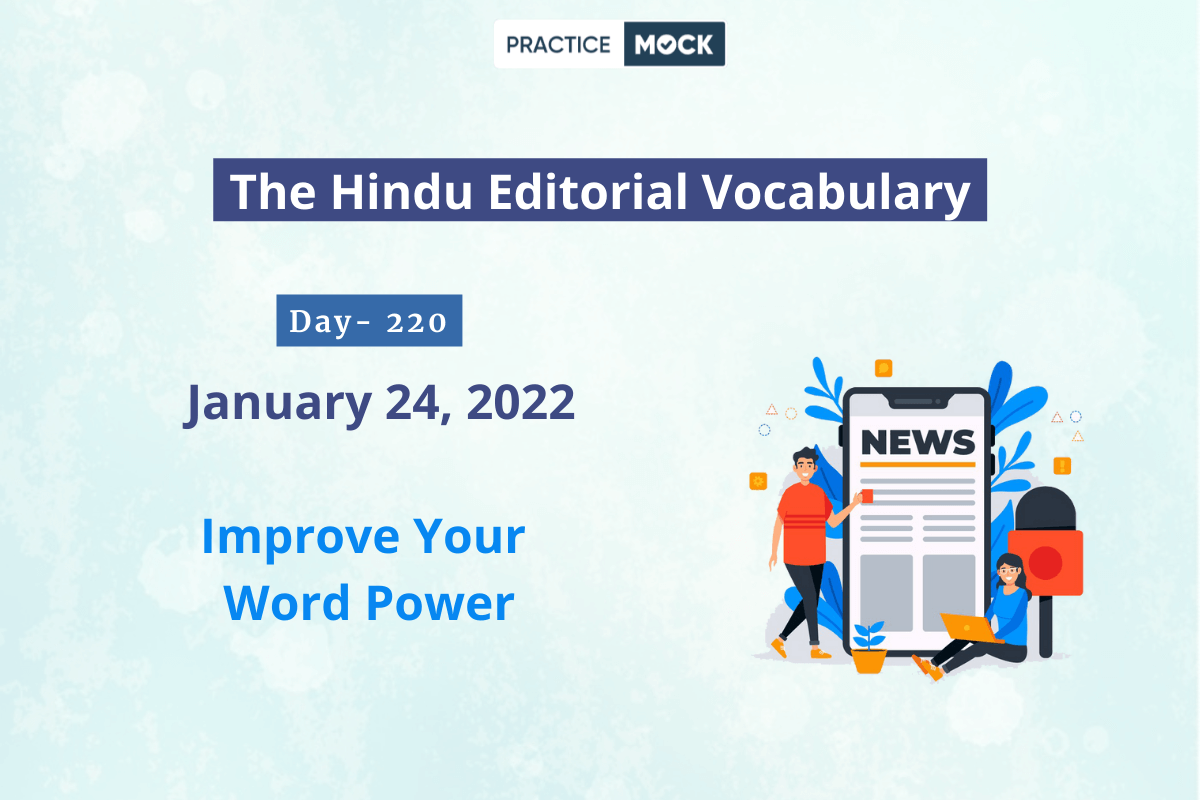| Difficult Word/ Phrase | Contextual Sense |
| Dichotomy | Being twofold; a classification into two opposed parts or subclasses |
| Binary | Consisting of two (units, components, elements or terms) |
| Superfluous | Serving no useful purpose; having no excuse for being |
| Facet | A distinct feature or element in a problem |
| Rhetoric | Insincere or vague talk with empty promises etc. that is supposed to impress |
| Obscure | Make less visible or unclear |
| Gauge | Accepted or approved instance or example of a quantity or quality against which others are judged or measured or compared |
| Evade | Avoid or try to avoid fulfilling, answering, or performing (duties, questions, or issues) |
| Envisage | Form a mental image of something that is not present or that is not the case |
| Imprimatur | A license or allowance to one to print |
False dichotomy (Being twofold; a classification into two opposed parts or subclasses): On merit versus reservation
The top court’s view that quotas ensure equal opportunity is a blow for affirmative action
The Supreme Court has once again addressed the ‘merit versus reservation’ debate, a misleading binary (Consisting of two (units, components, elements or terms)) that has engaged public and judicial discourse for years. While ruling in favour of extending reservation to OBCs in the all-India quota (AIQ) of seats in admission to under-graduate and post-graduate medical and dental courses, the Court has concluded that the binary has become superfluous (Serving no useful purpose; having no excuse for being). The courts have now come to recognise the idea of ‘substantive equality’, which sees affirmative action not as an exception to the equality rule, but as a facet (A distinct feature or element in a problem) of the equality norm. ‘Formal equality’, or the principle that everyone competes on an equal footing, is inadequate to address social inequalities and the inherent disadvantages of the less advanced sections, necessitating provisions that help them compete with the advanced classes. The competitive examination may be necessary for distribution of educational opportunities, but it does not enable equal opportunity for those competing without the aid of social and cultural capital, inherited skills and early access to quality schooling. Good performance in an examination does reflect hard work, but does not always reflect “merit” solely of one’s own making. “The rhetoric (Insincere or vague talk with empty promises etc. that is supposed to impress) surrounding merit obscures (Make less visible or unclear) the way in which family, schooling, fortune and a gift of talents that the society currently values aids in one’s advancement,” writes Justice D.Y. Chandrachud, and raises the relevant question whether marks are the best gauge (Accepted or approved instance or example of a quantity or quality against which others are judged or measured or compared) of individual merit. Seen in this light, reservation ensures that backward classes are able to avail of opportunities that “typically evade (Avoid or try to avoid fulfilling, answering, or performing (duties, questions, or issues)) them because of structural barriers”.
The provision of 27% reservation for OBCs within the AIQ was introduced only in July 2021. Implemented from 1986, the AIQ was envisaged (Form a mental image of something that is not present or that is not the case) as a domicile-free quota to access medical education in all colleges in the country. It comprises 15% of undergraduate medical and dental seats and 50% of post-graduate seats surrendered by the States for admission through a central pool. For two decades, there was no reservation in this segment. In 2007, the Court allowed the introduction of 15% reservation for SCs and 7.5% for STs. Even when the OBC quota was introduced in Central government institutions alone, there was none in State colleges. The decision to end this discrimination now has judicial imprimatur (A license or allowance to one to print). The Court has also rejected the argument that there was no need for reservation in post-graduate medical education. The impact of backwardness, it has said, does not simply disappear because a candidate has a graduate qualification and does not create parity between advanced classes and backward classes. The latest judgment marks another notable addition to the body of affirmative action jurisprudence.
Want to improve your vocabulary further? Download the Lists of Word-Meanings of Previous Months here.
- Sign Up on Practicemock for Updated Current Affairs, Free Topic Tests and Free Mini Mocks
- Sign Up Here to Download Free Study Material
Free Mock Tests for the Upcoming Exams
- IBPS PO Free Mock Test
- RBI Grade B Free Mock Test
- IBPS SO Free Mock Test
- NABARD Grade A Free Mock Test
- SSC CGL Free Mock Test
- IBPS Clerk Free Mock Test
- IBPS RRB PO Free Mock Test
- IBPS RRB Clerk Free Mock Test
- RRB NTPC Free Mock Test
- SSC MTS Free Mock Test
- SSC Strenographer Free Mock Test
- GATE Mechanical Free Mock Test
- GATE Civil Free Mock Test
- RRB ALP Free Mock Test
- SSC CPO Free Mock Test
- AFCAT Free Mock Test
- SEBI Grade A Free Mock Test
- IFSCA Grade A Free Mock Test
- RRB JE Free Mock Test
- Free Banking Live Test
- Free SSC Live Test



